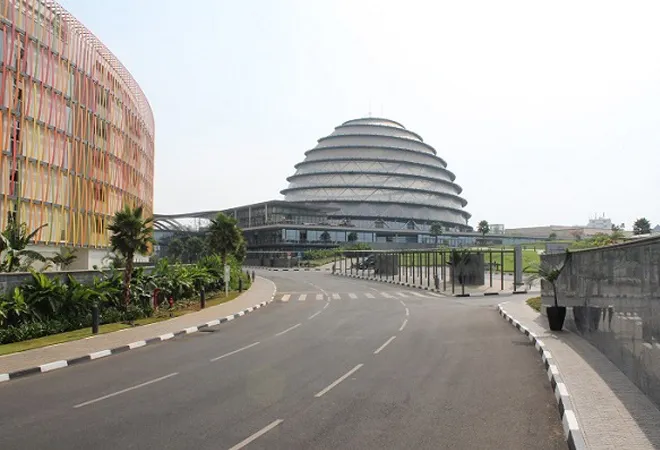
Kigali, the capital city of the African nation Rwanda, was in the news on 22 June as it hosted more than 50 Commonwealth countries for the 2022 Commonwealth Heads of Government Meeting (
CHOGM), held under the theme, ‘Delivering a Common Future: Connecting, Innovating, Transforming’. This was one of the many international events hosted in the city. It has been ranked the
second most popular destination in Africa for hosting international conferences and events by ICCA (International Congress and Convention Association). One factor that has made Kigali a preferred destination is Rwanda’s simplified visa process on arrival and many flights connecting the city to the world.
However, a fact much less talked about and massively contributing to Kigali’s attractiveness is the remarkable turnaround the city has achieved in sprucing up the city to be recognised as the
cleanest city in Africa. In 2018, UN Environment Programme Head Eric Solheim referred to Kigali as the
“cleanest city on the planet”, both in terms of lack of street rubbish and green initiatives. Those who have recently visited Kigali have expressed happy surprise at the exceptional levels of hygiene and cleanliness that the city continues to display. Indeed, Kigali has become a world icon in urban transformation.
In 2018, UN Environment Programme Head Eric Solheim referred to Kigali as the “cleanest city on the planet”, both in terms of lack of street rubbish and green initiatives.
How was this turnaround achieved? At the turn of this century, Kigali was like any other city with lots of people, slums, and waste. The situation was made worse by rapid demographic growth in the capital. From about 350,000 in 1996, the city is housing close to
1.2 million people today, expected to grow further. This sudden upsurge in inhabitants resulted in indiscriminately erected housing leading to a rise in informal settlements. However, towards the end of the first decade of this century, city authorities, with national government backing, decided to turn the city around. In 2008, as a first step, the city banned
single-use plastic bags. Plastic packaging material was also prohibited. Kigalians were asked to switch to bags made of degradable materials such as paper, linen, banana leaves, and papyrus.
Penalties for breaking these regulations were severe and could even lead to imprisonment. At the same time, the government encouraged entrepreneurs to set up facilities for the manufacture of permissible packaging material. The local government also began a drive to green the city with urban forestry and tree plantation initiatives.
The local communities played a significant role in the effort at cleanliness. On the last Saturday of every month, the Kigalians observe ‘
Umuganda’—the community self-help and cooperation practice. In traditional Rwandan culture, community members would call upon their family, friends, and neighbours to assist them in accomplishing a difficult task. In the same vein, the Kigalians clean areas of the city, picking up every bit of trash lying around. This participation also extends to building new roads, clearing land for community gardens, and constructing new classrooms or residential toilets for families that do not have them. During Umuganda, shops in the city remain shut, and cars are off the roads to facilitate the drive. Kigali has made participation in ‘Umuganda’
mandatory, and non-participation could result in hefty fines. Besides enforcement, the authorities also organise
awareness campaigns to make cleanliness a part of Kigalian culture. Aesthetically designed waste bins are carefully placed in public places, including footpaths, shopping areas, and transportation hubs.
Kigalians were asked to switch to bags made of degradable materials such as paper, linen, banana leaves, and papyrus.
In 2009, the city authorities, in the course of the cleanliness drive, realised that the city had grown haphazardly in certain sectors. Some semblance of order was required in the capital that needed more roads, green spaces, and reconfigured land use. Towards achieving this, they first took up the
demolition of poorly built and poorly serviced slums and unauthorized construction to make way for new roads and better housing. This obviously led to resistance from the slum-dwellers that were displaced. A program, therefore, had to be started targeting to resettle the displaced population and compensate them for their losses.
Preliminary experiences also directed the authorities to draw up a more comprehensive
master plan for Kigali that comprised multiple aspects of the city that needed re-engineering—environment, transportation, traffic congestion, signages, and social inclusion. To reduce traffic congestion, the Rwandan government invested
US $76 million to pave narrow streets, widen all main roads to dual carriageways, and refurbish signages. The city also upgraded its bus services between the suburbs and the city centre, encouraging citizens to use public transport. The local government also banned minibuses and cars from entering the central city areas. The Rwandan government spent
US$ 40 million to relocate factories to a newly crafted Special Economic Zone (SEZ) to remove them from wet areas. Many other businesses displaced by the cleanliness drive were provided compensation and help in relocation. However, the unauthorised ones received no such assistance.
The Rwandan government spent US$ 40 million to relocate factories to a newly crafted Special Economic Zone (SEZ) to remove them from wet areas.
Many cities worldwide have made efforts toward cleanliness and in the process, have made great progress to begin with. But cleanliness is an effort that must be relentless. Such an effort has been difficult for many cities that have relapsed into low levels of sanitation. What is remarkable is that Kigali continues to be sparkling clean, day in and day out. Additionally, the city stands beautified by flowers on medians, new gardens, more trees, and groups of sweepers working in shifts to maintain roads, footpaths, and public places.
In this regard, voices do get heard about the government’s
ruthless implementation of its resolve to keep the city clean. Authorities have indeed been harsh in clearing out informal settlements, driving away factories from wetlands, and enforcing ‘Umuganda’ without brooking any opposition. Some have termed ‘umuganda’ as forced labour. In many ways, critics saw semblances of the social disruption caused by Haussmann’s renovation of Paris that displaced large numbers of the poor on account of the demolition of their dwellings. However, it is also true that efforts were made by Kigali authorities to resettle the poor and provide alternate sites for factories along with compensation. Notwithstanding the strict implementation, the end result has been that practices of cleanliness seem to have become second nature to the majority of citizens and now are an accepted way of civic life.
Authorities have indeed been harsh in clearing out informal settlements, driving away factories from wetlands, and enforcing ‘Umuganda’ without brooking any opposition.
What lessons does Kigali have for other cities? Three things stand out:
- There must be a comprehensive plan for cleanliness so that each element of public hygiene, backed by appropriate land use, gets simultaneously implemented. Merely picking up waste is not enough. The city must be laid out in some order so that the job of cleanliness becomes manageable.
- The magnitude of the task is such that enforcement is vital so that everyone falls in line and contributes to the fulfillment of objectives. This is because everyone generates waste on a daily basis; hence everyone has a share in the responsibility to clean up the city.
- The effort has to be relentlessly ongoing so that the city does not relapse into practices that would destroy the spotless cleanliness of the city.
Kigali also demonstrates that the rewards for cleanliness are multi-dimensional. The city has become a highly sought-after destination for businesses, conferences, and international tourism, leading to the city and country's rapid economic development.
The views expressed above belong to the author(s). ORF research and analyses now available on Telegram! Click here to access our curated content — blogs, longforms and interviews.



 Kigali, the capital city of the African nation Rwanda, was in the news on 22 June as it hosted more than 50 Commonwealth countries for the 2022 Commonwealth Heads of Government Meeting (
Kigali, the capital city of the African nation Rwanda, was in the news on 22 June as it hosted more than 50 Commonwealth countries for the 2022 Commonwealth Heads of Government Meeting ( PREV
PREV


